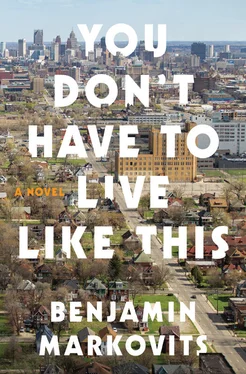That was the line we’d been told to spin by the heavily bearded and buttoned dude at Obama HQ. HQ makes it sound too grand, it was a defunct Honey Dew Donuts in downtown Claremont. The place was full of Yalies, wearing overpriced pseudo-workingman’s clothes: leather boots, tough khakis and plaid shirts. After each run we reported back; they wanted a house-by-house account of the swing-vote situation. At one point I bumped into Robert James.
He said, “Marny, there’s something I want to talk to you about.” So he turned to the bearded guy and told him, “Phil, I’m taking off,” and led me to his car, which was parked in the square, and we drove out to his parents’ house in the woods.
I’d heard about this place in college. Robert sometimes invited a few friends back when his folks were out of town, though I wasn’t one of them. Sometimes he just came with Beatrice, his college girlfriend. She was a friend of mine, too, she was my friend first, and maybe that’s why I didn’t make the cut. Anyway, I never got invited. It was a two-hundred-year-old farmhouse set back off a dirt road, with a one-step stoop and brightly painted shutters beside the windows. Rosebushes lined the path to the front door, and I could see around the side of the house an apple orchard falling away to a pond at the bottom of the garden. The rest of the land was covered in trees.
Robert’s mom was as handsome as her son. Steely-haired and unmade-up, she limped around the house in a boot cast. But a broken foot didn’t stop her from bringing us coffee and slices of Bundt cake to the screened-in back porch.
“Where’d you get that?” I said, and she smiled at me. There was still something left of the way a good-looking woman looks at a man.
“That’s sweet. I made it.”
“No, I mean the foot.”
“Oh, it was stupid. We were hiking out by Ripley Falls and I slipped on some gravel. Five years ago I would have finished the hike, but I’ve got old-lady bones. One of them broke. A very small one, but it hurt.”
When she banged her way out again, he said, “I’ve been meaning to get in touch with you. What are you doing with yourself these days?”
“Not much.”
“Because I’ve been thinking of taking you up on that Detroit idea.”
Obama’s success, though he wouldn’t say so, had wrong-footed him. He was late to get on the bandwagon and didn’t have the right Chicago connections anyway — he didn’t know anyone from the inner circle. Braylon Carr, the mayor he backed in Buffalo, had a difficult relationship with Obama. Bill Clinton had campaigned for him, and Carr had put his neck out for Hillary in the New York primaries. Robert knew the Clintons fairly well. He admired Obama and was trying to make up lost ground, but he wanted something to do in the meantime, something high profile, that would get the right kind of attention. Detroit was all over the news. Chrysler, Ford and GM, the Big Three, had just asked for a $50 billion bailout, and Congress was negotiating a package.
Robert wanted to talk me through the idea.
“I can’t buy up the city, but I can put some investors together and buy up sections of it. Nobody wants to move there alone, but you can use the Internet, you can use Facebook — what I’m talking about is a kind of Groupon model for gentrification. The question is,” he said, “who would go there and what would they do when they got there? These neighborhoods are in bad shape. It’s basically a war zone — I mean that, in the middle of America. People are burning down houses, and not just for the insurance. My friend Bill Russo took me around. It’s like driving through London after the Blitz. The city has given up on certain blocks; the fire service won’t come out to them anymore. But there are still some beautiful big houses standing empty. You could do whatever you want with them, set up any kind of society. There’s a guy who talks about plowing the land into farms. But you’d need a critical mass of people to make it work. People like you, but would people like you move to Detroit? I mean, would you ?”
“Yes,” I said.
Afterwards, he drove me back to Claremont and I went out again with another carload of volunteers. The sun set around half past six, the temperature dropped, and the sky between the mountains turned a very bright evening shade of dark blue. I had that feeling you get when you’re a kid out playing in the yard and you see the lights turn on at home — outside looking in. The shape and movements of people, closing curtains and sitting down to watch TV. All these private lives. It seemed a shame to make them open their front doors. Then we drove back to HQ and Phil ordered pizza; later a few of us walked out into the cold country night looking for a bar.
Roughly six months later I set off. Obama had won, the economy was going down the tubes, it seemed a good time to try something new. My dad loaned me five thousand dollars and I spent three hundred bucks of it on a secondhand car — a ’91 Taurus, the last in the series to offer a stick shift. I figured the shittier the better. On my last night at home, after supper, my father went into the yard to smoke a cigarette. He smoked maybe one or two a month, and it always put my mother in a sour mood. She made a pot of decaf and passed me a cup across the kitchen table.
“He’s worried about you, that’s why he’s smoking again,” she said. “You’re too old to play games like this.”
“That’s just not true, he always smokes — a little. What I’m too old for is living at home with you guys.”
“I don’t mind.”
“You sound like Granma Dot,” I said.
A year before she died, after a bad stroke, my grandmother came to live with us. She didn’t want to be a burden, and if you asked her anything like, what do you want for lunch, she answered, “I don’t mind.” My father used to beg her for an answer, something specific, but she never budged; it drove him crazy. At the same time she was highly critical of everything: the heat, the people, the food.
She died from a staph infection after hip-replacement surgery. This was around Easter of my sophomore year in high school. After the funeral, for which my mom held it together pretty well, she waited until we were alone and then broke down. I was helping her write out thank-you cards; a few friends from Puyallup had sent flowers.
“It’s okay,” I said, feeling embarrassed. “She was really old. I don’t think she—”
But my mother shook her head. “It’s not that,” she said. “I wanted you to like her more. I don’t think you liked her very much. But when I was a girl, she was my mother, there was no one else.”
Of course, this was true for me, too, and here was my mother sitting across the kitchen table. Every year she looked more like Granma. Dot had bad eyes, there was a kind of film over them, like the skin on warm cream, and glasses made her eyes seem bulgy. My mother had started wearing glasses, too, and not just for reading. With her hair cut short she looked like an old little girl.
Then my father clattered in the door, bringing some of the smoke smell with him. “Come on, kid, you’ve got a long drive tomorrow. Get some sleep.”
He put his hand to the side of my face, so I turned my cheek against it.
“Mom says you’re worried about me,” I said.
“That’s our job. It’s your job not to mind too much.”
After brushing my teeth and changing into pajamas, I came back into the kitchen to kiss her good night. She was still sitting at the table, which was covered in the bright plastic sunflowers of the tablecloth; they glared under the hanging lamp. My mother let me kiss her sitting down.
Читать дальше












